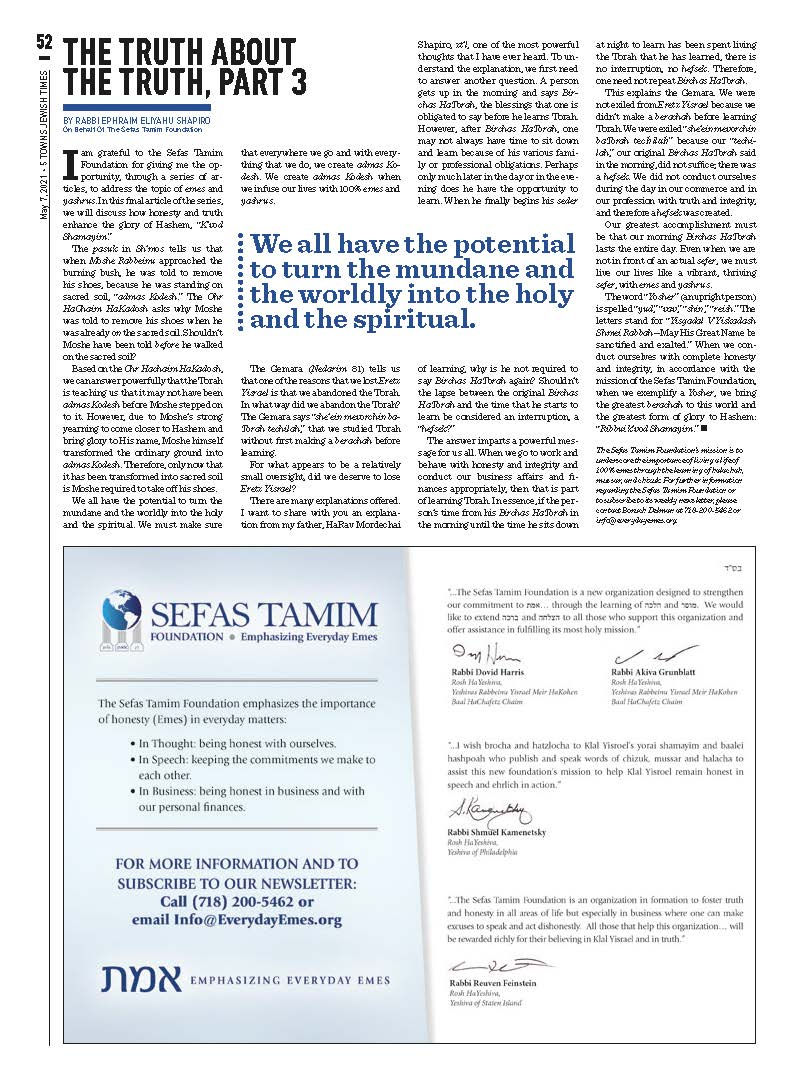The Truth About the Truth - Part 3
- Sefas Tamim
- Jul 6, 2021
- 3 min read
Updated: Jul 14, 2021
by Rabbi Ephraim Eliyahu Shapiro on behalf of the Sefas Tamim Foundation

I am grateful to the Sefas Tamim Foundation for giving me the opportunity, through a series of articles, to address the topic of Emes and Yashrus. In this final article of the series, we will discuss how honesty and truth enhance the glory of Hashem – “Kovod Shamayim”.
The possuk in Sh’mos tells us that when Moshe Rabbeinu approached the burning bush, he was told to remove his shoes, because he was standing on sacred soil – “Admas Kodesh”. The Ohr HaChaim Hakodeh asks, why Moshe was told to remove his shoes when he was already on the sacred soil. Shouldn’t Moshe have been told before he walked on the sacred soil?
Based on the Ohr Hachaim Hakadosh we can answer powerfully, that the Torah is teaching us that it may not have been Admas Kodesh before Moshe stepped on to it. However, due to Moshe’s strong yearning to come closer to Hashem and bring glory to His name, Moshe himself transformed the ordinary ground into Admas Kodesh. Therefore, only now that it has been transformed into sacred soil, is Moshe required to take off his shoes.
We all have the potential to turn the mundane and the worldly into the holy and the spiritual. We must make sure, that everywhere we go and with everything that we do, we create Admas Kodesh. We create Admas Kodesh when we infuse our lives with 100% Emes and Yashrus.
The Gemara (Nedarim 81) tells us that one of the reasons that we lost Eretz Yisrael is that we abandoned the Torah. In what way did we abandon the Torah? The Gemara says “sh’ein mevorchin baTorah techila”- that we studied Torah without first making a Bracha before learning.
For what appears to be a relatively small oversight, did we deserve to lose Eretz Yisrael?
There are many explanations offered. I want to share with you an explanation from my father HaRav Mordechai Shapiro ZT’L - one of the most powerful thoughts that I have ever heard. To understand the explanation, we first need to answer another question. A person gets up in the morning and says Birchas HaTorah - the blessings that one is obligated to say before he learns Torah. However, after Birchas HaTorah, one may not always have time to sit down and learn because of his various family or professional obligations. Perhaps only much later in the day or in the evening, does he have the opportunity to learn. When he finally begins his seder of learning, why is he not required to say Birchas HaTorah again? Shouldn’t the time lapse between the original Birchas HaTorah and the time that he starts to learn be considered an interruption – a “Hefsek”?
The answer imparts a powerful message for us all. When we go to work and behave with honesty and integrity, and conduct our business affairs and finances appropriately, then that is part of learning Torah. In essence, if the person’s time between his Birchas HaTorah in the morning until the time he sits down at night to learn, has been spent living the Torah that he has learned - there is no interruption - no Hefsek. Therefore, one need not repeat Birchas HaTorah.
This explains the Gemara. We were not exiled from Eretz Yisrael because we didn’t make a Bracha beforehand. We were exiled “sh’ein mevorchin baTorah techila” because our "techila" -our original Birchas HaTorah said in the morning did not suffice - there was a Hefsek. We did not conduct ourselves during the day in our commerce and in our profession with truth and integrity, and therefore a Hefsek was created.
Our greatest accomplishment must be that our morning Birchas HaTorah lasts the entire day. Even when we are not in front of an actual Sefer, we must live our lives like a vibrant, thriving Sefer - with Emes and Yashrus.
The word “Yosher” (an upright person) is spelled -“Yud”, “Vav”, “Shin”, “Raish”. The letters stand for “Yisgadal V’yiskadash Shmeah Rabbah.” – May His Great Name be Sanctified and Exalted. When we conduct ourselves with complete honesty and integrity, in accordance with the mission of the Sefas Tamim Foundation, when we exemplify a Yosher, we bring the greatest Bracha to this world and the greatest form of glory to Hashem – “Ribbui Kavod Shamayim”.
For more information on the Sefas Tamim Foundation and its mission of Emphasizing Everyday Emes, please contact Boruch Delman at 718-200-5462 or info@everydayemes.org.

